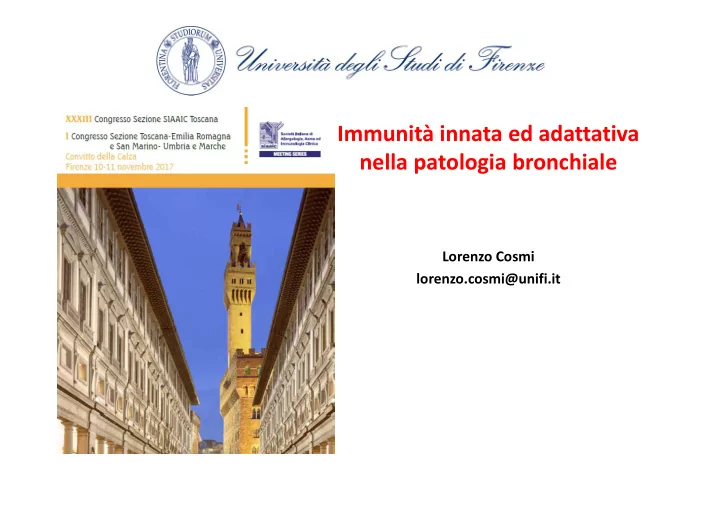

Immunità innata ed adattativa nella patologia bronchiale Lorenzo Cosmi lorenzo.cosmi@unifi.it
Cooperazione tra immunità innata e acquisita B B B Produzione di B anticorpi DC opsonizzazione del patogeno MF NK T T T T Produzione di T citochine etc Tempo ore giorni
The 3 major types of innate and adaptive cell-mediated effector immunity Annunziato F JACI 2015
Regulation of ILC2 by soluble-molecules and cell-to-cell receptors Halim TYF Int Immunol 2015 Klose C Nat Immunol 2016
Increased numbers of activated ILC2 in the airways of patients with severe asthma and persistent airway eosinophilia Smith SG L JACI 2016
Allergic rhinitis patients have increased recruitment of ILC2s to the upper airways following allergen challenge Dhariwal J Am J Respir Crit Care Med 2017
Salimi M JEM 2013
Maggi L JACI 2017
Role of type 2 Innate Lymphoid Cells in asthma Cosmi L Curr Allergy Asthma Rep 2017
Monoclonal antibodies that target ILC2 in asthma Mitchell P Clin Pharmacol Ter 2016
In this double-blind, placebo-controlled study, we randomly assigned 31 patients with mild allergic asthma to receive three monthly doses of AMG 157 (700 mg) or placebo intravenously. Treatment with AMG 157 reduced allergen- induced bronchoconstriction and indexes of airway inflammation before and after allergen challenge. Gauvreau G NEJM 2014
Tezepelumab in Adults with Uncontrolled Asthma Among patients treated with long- acting beta-agonists and medium- to-high doses of inhaled glucocorticoids, those who received tezepelumab had lower rates of clinically significant asthma exacerbations than those who received placebo, independent of baseline blood eosinophil counts Corren J NEJM 2017
CRTH2 antagonist in the treatment of eosinophilic asthma
Gonem S Lancet Respir Med 2016
Multiple targets of prostaglandin D2 receptor antagonists Cosmi L Am J Respir Crit Care Med. 2017
Mepolizumab and Reslizumab bind IL-5, whereas Benralizumab binds IL-5Rα Varricchi G Curr Opin Allergy Clin Immunol 2016
IL-33 induces selective remodeling of chromatin at the Il5 Locus in memory Th2 Cells IL-33 selectively licensed memory Th2 cells to induce allergic airway inflammation via production of IL-5 and the p38 MAP kinase pathway was a central downstream target of IL-33-ST2 in memory Th2 cells. Endo Y Immunity 2015
In inner-city African American children, 12 cytokines were significant predictors of Difficult-to-Control asthma (n = 235). CXCL-1, IL-5, IL-8, and IL-17A were positively associated with Difficult-to-Control asthma, while IL-4 and IL-13 were positively associated with Easy-to-Control asthma. Mixed responses characterized by TH2 (IL-5) and TH17-associated cytokines were associated with Difficult-to-Control asthma. Collectively, these data may contribute to risk stratification of Difficult-to-Control asthma in the African American population Brown KR PLoS One 2017
576 patients with recurrent asthma exacerbations and evidence of 135 patients with severe eosinophilic asthma, treated with mepolizumab administered eosinophilic inflammation despite high doses of inhaled glucocorticoids Patients subcutaneously every 4 weeks for 20 weeks. Despite receiving a reduced glucocorticoid dose, were assigned to receive mepolizumab, either a 75-mg intravenous dose or a 100- patients in the mepolizumab group, had a mg subcutaneous dose, or placebo every relative reduction of 32% in the annualized rate of exacerbations. 4 weeks for 32 weeks Bel EH NEJM 2014 Ortega HG NEJM 2014
Mepolizumab for Eosinophilic COPD Mepolizumab at a dose of 100 mg was associated with a lower annual rate of moderate or severe exacerbations than placebo among patients with COPD and an eosinophilic phenotype. This finding suggests that eosinophilic airway inflammation contributes to COPD exacerbations. Pavord ID NEJM 2017
IL-4/IL-13 receptors and signaling pathways Ingram J JACI 2012
Mechanism of action of Dupilumab Dupilumab binds to the IL-4α chain prohibiting either IL-4 or IL-13 from binding and subsequent signaling through the STAT6 pathway Casale T JACI 2017
Dupilumab effects in uncontrolled persistent asthma Total Eosinophils > 300 Eosinophils < 300 Wenzel S Lancet 2016
Th17 lymphocytes: new players in asthma pathogenesis Cosmi L Allergy 2011
Possible role of different T-cell subsets in the pathogenesis of asthma and COPD Cosmi L Curr Opin Allergy Clin Immunol 2016
Brodalumab blocks both IL-17A and IL-25 Brodalumab binds human interleukin-17RA and blocks the biologic activity of interleukins 17A, 17F, 17A/F heterodimer, 17C and 17E (interleukin-25) Nirula A Rheumatology 2017
Brodalumab has been tested in patients with severe asthma, although patients with neutrophilia were unfortunately not selected for this study Conclusions : Inhibition of IL-17 receptor A did not produce a treatment effect in subjects with asthma. Primary endpoint was change in Asthma Control Questionnaire (ACQ) score from baseline to week 12. Secondary endpoints included FEV1, symptom scores, and symptom-free days. The results of the high-reversibility subgroup (post-bronchodilator FEV 1 improvement ≥ 20%; n = 112) was an ACQ change with nominal significance noted; analysis are of uncertain significance, requiring further study of brodalumab in this asthma subpopulation. Busse W et al. Am J Resp Crit Care Med 2013
Concluding remarks Biologicals targeting both innate and adaptive immunity are effective in type 2 • inflammation in bronchial asthma if patients are selected on the basis of their asthma phenotype. Despite stratification, in non-type 2 asthma and in COPD the results of targeted therapy have proved disappointing. Bel E Chest 2017
Center for Research Dept. of Clinical & “DENOTHE” Experimental Medicine Francesco Annunziato Raffaele De Palma Sergio Romagnani Enrico Maggi Francesco Liotta Laura Maggi Alessio Mazzoni Dipartimento di Patologia e Manuela Capone Diagnostica Veronica Santarlasci Marco Cassatella Maria Caterina Rossi Gianni Montaini Beatrice Rossettini Paola Parronchi Oliviero Rossi Dept. of Paediatrics, Andreas Radbruch Rheumatology Unit Hyun-Dong Chang Rolando Cimaz Jun Dong
Recommend
More recommend